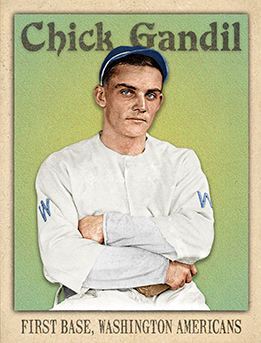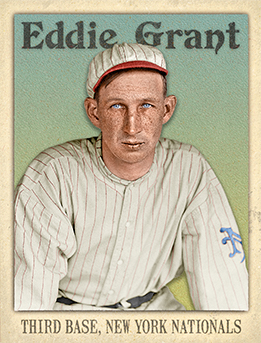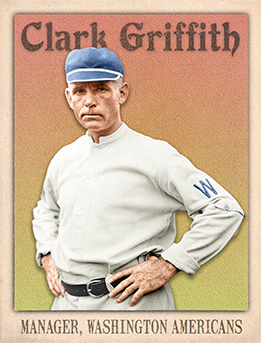- Series: Diamond Heads '15
- City: Washington, D.C.
- Team: Senators
- League: American League
Charles Arnold Gandil (1888-1970) was described in the Chicago Tribune in March 1917 as “the ideal type of athlete – a fighter on the field, a player who never quits under the most discouraging circumstances and … is one of the most dangerous batters in the league when a hit means a ball game.” This tribute heralded Gandil’s return to his original club, Charles Comiskey’s White Sox. He didn’t set the world on fire in ’17 and ’18 but the club became a strong favorite to win it all in 1919. Rife with dissension directed at the miserly owner, by his own admission in a 1956 SI account, Gandil led a conspiracy to throw the Series. Everything came undone and by 1921 eight Sox players were banned for life. Gandil admitted to being the main instigator of the affair but insisted the actual Series losses were unintentional.
- Was a stand-out first-baseman for Clark Griffith’s Senators
- Lifetime BA of .277
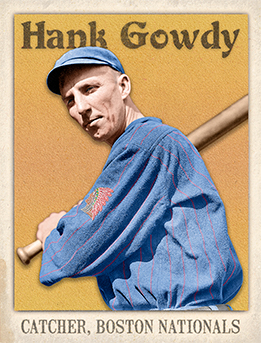
- Series: Diamond Heads '15
- City: Boston
- Team: Braves
- League: National League
Henry Morgan Gowdy (1889-1966) made his name on the ball field and his fame on the battlefield. A catcher and first baseman, Gowdy debuted with the Giants in 1910, getting into a few games over his first four seasons before claiming the starting catcher’s job with the Boston Braves in 1914. He became a key contributor to that “miracle” season as his team achieved a first: winning it all following their last-place finish in ‘13. This was far from the only “first” in Gowdy’s distinguished life and career. He would go on to become the first major leaguer to enlist in World War I, return a hero and tour the country relating his wartime experiences and then return to Boston. After a playing career spanning three decades, Gowdy would then sign up as a captain in WWII, the only player to serve in both conflicts. Again, Hank returned to the game he loved as a coach with Cincinnati, finally retiring in 1948.
- Having starred in the ‘14 Series, Gowdy played the goat when his error led to the Giants’ heartbreak loss to the Senators in 1924
- Another “record” for this great American player/warrior: received votes for induction to the HOF 17 times without success, exceeded only by Edd Roush who finally made it in
- Series: Diamond Heads '15
- City: New York
- Team: Giants
- League: National League
Edward Leslie Grant (1883-1918) had a cup of coffee replacing an ailing Nap Lajoie with the Indians at the end of the 1905 season, upon his graduation from Harvard. Caught on with the Phillies ’07-10, then played for the Reds and Giants thru 1915. An early enlistee for WWI, Grant became the 1st ML veteran to die in that conflict, leading a heroic search for the “Lost Battalion.”
- A Harvard lawyer (’09), Grant refused to holler “I Got It!,” preferring “I Have It!”
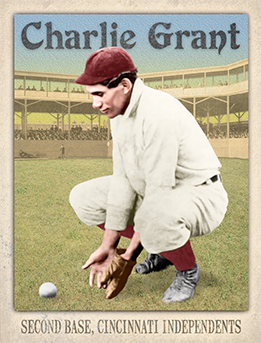
- Series: Diamond Heads '15
- City: Cincinnati
- Team: Stars (IND)
- League: Independent
Charles Grant Jr. (1874-1932) replaced Sol White at second base in 1896 when White left the Page Fence Giants, a move that came back to bite White's Cuban X-Giants later that year when Grant's team won the championship series 10 games to 5. Page Fence folded in '99 and Charlie moved to the Columbia Giants of Chicago. But is wasn't his prowess afield in the early Black leagues that brought Grant to the razor's edge of history. The smooth-fielding youngster worked in a hotel in Hot Springs, AR in the off-seasons where John McGraw's Orioles trained. McGraw, ever-voracious for talent, spied Grant playing pick-up games with co-workers and immediately judged him to be of major league caliber. The color-line was obdurate but McGraw seized on the ploy of passing Grant off as a Native American, even dubbing him “Tokohama” after a name he saw on the hotel's map. The scheme almost worked. Sol White tells the story of how McGraw's efforts to surreptitiously integrate the American League foundered when Baltimore went up to Chicago en route from spring training. Comiskey noticed that Grant's friends in town had shown up to applaud him and even sent a bouquet. Outed, McGraw had to yield to the league's segregation. White shared McGraw's esteem for Grant's ability: “I will give any 'fan' a good ten-cent cigar who will call my attention or, rather, recall my memory to an error on a ground ball or a muffed fly by Charley Grant.” His chance at national fame thwarted, Grant continued a very successful career in Black ball.
- Never a strong hitter, Grant always earned his keep at second. He died tragically, struck by a car that had blown a tire. In death, this great player received a measure of the recognition of which he was deprived by baseball's moguls. He is buried a short distance from Hall of Fame second-sacker Miller Huggins at Spring Grove Cemetery in Cincinnati
- Series: Diamond Heads '15
- City: Washington, D.C.
- Team: Senators
- League: American League
- Hall: National Baseball Hall of Fame
Clark Calvin Griffith (1869-1955) was a successful pitcher for over 20 years but had only just begun his baseball career. AL founder Ban Johnson prevailed on Griffith to take the helm of the NY entry into the new league in 1903. That began a tenure as manager and owner that lasted until Griffith’s death in 1955. With a showman’s touch and a veteran player’s savvy, Griffith turned around the D.C. franchise.
- Only one in history to be a player, manager and owner for over 20 years in each role
- Counted eight U.S. presidents as friends during his long tenure as owner of the Senators
- Elected to Hall of Fame: 1946
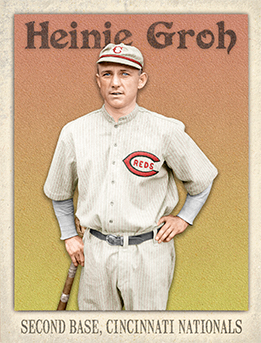
- Series: Diamond Heads '15
- City: Cincinnati
- Team: Reds (NL)
- League: National League
Henry Knight Groh (1889-1968) was one of the best all-around third baseman in baseball. He is considered the National League’s premier specialist at the hot corner during the Deadball Era in which he starred for the Giants and Reds. Groh set fielding records in numerous categories, some of which have never been exceeded in the long history of the Senior Circuit. As good as he was at his position, the diminutive Groh was even more effective at bat, wielding an unusual “bottle bat” to enable his small hands to bunt and hit-and-run with the best. Heinie came up with McGraw’s Giants in 1912 but was soon shipped to Cincinnati where he emerged as a talented lead-off-hitting second-baseman. When manager Buck Herzog moved Groh to third, his career skyrocketed. He chafed under the Reds’ leadership, holding out, getting a chance to return to NY, then having Judge Landis veto the deal lest a player gain actual leverage over ownership. In 1922 Groh finally rejoined his original team and helped them to the pennant.
- His performance in the Series that year was sensational, including a .474 average that Groh kept on his Ohio license plate the rest of his life
- Led the NL in double plays six times and fielding % five times, both still records
